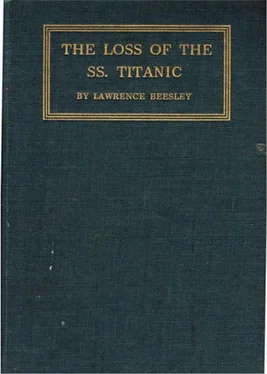We dropped down Spithead, past the shores of the Isle of Wight looking superbly beautiful in new spring foliage, exchanged salutes with a White Star tug lying-to in wait for one of their liners inward bound, and saw in the distance several warships with attendant black destroyers guarding the entrance from the sea. In the calmest weather we made Cherbourg just as it grew dusk and left again about 8.30, after taking on board passengers and mails. We reached Queenstown about 12 noon on Thursday, after a most enjoyable passage across the Channel, although the wind was almost too cold to allow of sitting out on deck on Thursday morning.
The coast of Ireland looked very beautiful as we approached Queenstown Harbour, the brilliant morning sun showing up the green hillsides and picking out groups of dwellings dotted here and there above the rugged grey cliffs that fringed the coast. We took on board our pilot, ran slowly towards the harbour with the sounding-line dropping all the time, and came to a stop well out to sea, with our screws churning up the bottom and turning the sea all brown with sand from below. It had seemed to me that the ship stopped rather suddenly, and in my ignorance of the depth of the harbour entrance, that perhaps the sounding-line had revealed a smaller depth than was thought safe for the great size of the Titanic: this seemed to be confirmed by the sight of sand churned up from the bottom—but this is mere supposition. Passengers and mails were put on board from two tenders, and nothing could have given us a better idea of the enormous length and bulk of the Titanic than to stand as far astern as possible and look over the side from the top deck, forwards and downwards to where the tenders rolled at her bows, the merest cockleshells beside the majestic vessel that rose deck after deck above them. Truly she was a magnificent boat! There was something so graceful in her movement as she rode up and down on the slight swell in the harbour, a slow, stately dip and recover, only noticeable by watching her bows in comparison with some landmark on the coast in the near distance; the two little tenders tossing up and down like corks beside her illustrated vividly the advance made in comfort of motion from the time of the small steamer.
Presently the work of transfer was ended, the tenders cast off, and at 1.30 P.M., with the screws churning up the sea bottom again, the Titanic turned slowly through a quarter-circle until her nose pointed down along the Irish coast, and then steamed rapidly away from Queenstown, the little house on the left of the town gleaming white on the hillside for many miles astern. In our wake soared and screamed hundreds of gulls, which had quarrelled and fought over the remnants of lunch pouring out of the waste pipes as we lay-to in the harbour entrance; and now they followed us in the expectation of further spoil. I watched them for a long time and was astonished at the ease with which they soared and kept up with the ship with hardly a motion of their wings: picking out a particular gull, I would keep him under observation for minutes at a time and see no motion of his wings downwards or upwards to aid his flight. He would tilt all of a piece to one side or another as the gusts of wind caught him: rigidly unbendable, as an aeroplane tilts sideways in a puff of wind. And yet with graceful ease he kept pace with the Titanic forging through the water at twenty knots: as the wind met him he would rise upwards and obliquely forwards, and come down slantingly again, his wings curved in a beautiful arch and his tail feathers outspread as a fan. It was plain that he was possessed of a secret we are only just beginning to learn—that of utilizing air-currents as escalators up and down which he can glide at will with the expenditure of the minimum amount of energy, or of using them as a ship does when it sails within one or two points of a head wind. Aviators, of course, are imitating the gull, and soon perhaps we may see an aeroplane or a glider dipping gracefully up and down in the face of an opposing wind and all the time forging ahead across the Atlantic Ocean. The gulls were still behind us when night fell, and still they screamed and dipped down into the broad wake of foam which we left behind; but in the morning they were gone: perhaps they had seen in the night a steamer bound for their Queenstown home and had escorted her back.
All afternoon we steamed along the coast of Ireland, with grey cliffs guarding the shores, and hills rising behind gaunt and barren; as dusk fell, the coast rounded away from us to the northwest, and the last we saw of Europe was the Irish mountains dim and faint in the dropping darkness. With the thought that we had seen the last of land until we set foot on the shores of America, I retired to the library to write letters, little knowing that many things would happen to us all—many experiences, sudden, vivid and impressive to be encountered, many perils to be faced, many good and true people for whom we should have to mourn—before we saw land again.
There is very little to relate from the time of leaving Queenstown on Thursday to Sunday morning. The sea was calm,—so calm, indeed, that very few were absent from meals: the wind westerly and southwesterly,—“fresh” as the daily chart described it,—but often rather cold, generally too cold to sit out on deck to read or write, so that many of us spent a good part of the time in the library, reading and writing. I wrote a large number of letters and posted them day by day in the box outside the library door: possibly they are there yet.
Each morning the sun rose behind us in a sky of circular clouds, stretching round the horizon in long, narrow streaks and rising tier upon tier above the sky-line, red and pink and fading from pink to white, as the sun rose higher in the sky. It was a beautiful sight to one who had not crossed the ocean before (or indeed been out of sight of the shores of England) to stand on the top deck and watch the swell of the sea extending outwards from the ship in an unbroken circle until it met the sky-line with its hint of infinity: behind, the wake of the vessel white with foam where, fancy suggested, the propeller blades had cut up the long Atlantic rollers and with them made a level white road bounded on either side by banks of green, blue, and blue-green waves that would presently sweep away the white road, though as yet it stretched back to the horizon and dipped over the edge of the world back to Ireland and the gulls, while along it the morning sun glittered and sparkled. And each night the sun sank right in our eyes along the sea, making an undulating glittering path way, a golden track charted on the surface of the ocean which our ship followed unswervingly until the sun dipped below the edge of the horizon, and the pathway ran ahead of us faster than we could steam and slipped over the edge of the skyline,—as if the sun had been a golden ball and had wound up its thread of gold too quickly for us to follow.
From 12 noon Thursday to 12 noon Friday we ran 386 miles, Friday to Saturday 519 miles, Saturday to Sunday 546 miles. The second day’s run of 519 miles was, the purser told us, a disappointment, and we should not dock until Wednesday morning instead of Tuesday night, as we had expected; however, on Sunday we were glad to see a longer run had been made, and it was thought we should make New York, after all, on Tuesday night. The purser remarked: “They are not pushing her this trip and don’t intend to make any fast running: I don’t suppose we shall do more than 546 now; it is not a bad day’s run for the first trip.” This was at lunch, and I remember the conversation then turned to the speed and build of Atlantic liners as factors in their comfort of motion: all those who had crossed many times were unanimous in saying the Titanic was the most comfortable boat they had been on, and they preferred the speed we were making to that of the faster boats, from the point of view of lessened vibration as well as because the faster boats would bore through the waves with a twisted, screw-like motion instead of the straight up-and-down swing of the Titanic. I then called the attention of our table to the way the Titanic listed to port (I had noticed this before), and we all watched the sky-line through the portholes as we sat at the purser’s table in the saloon: it was plain she did so, for the sky-line and sea on the port side were visible most of the time and on the starboard only sky. The purser remarked that probably coal had been used mostly from the starboard side. It is no doubt a common occurrence for all vessels to list to some degree; but in view of the fact that the Titanic was cut open on the starboard side and before she sank listed so much to port that there was quite a chasm between her and the swinging lifeboats, across which ladies had to be thrown or to cross on chairs laid flat, the previous listing to port may be of interest.
Читать дальше












